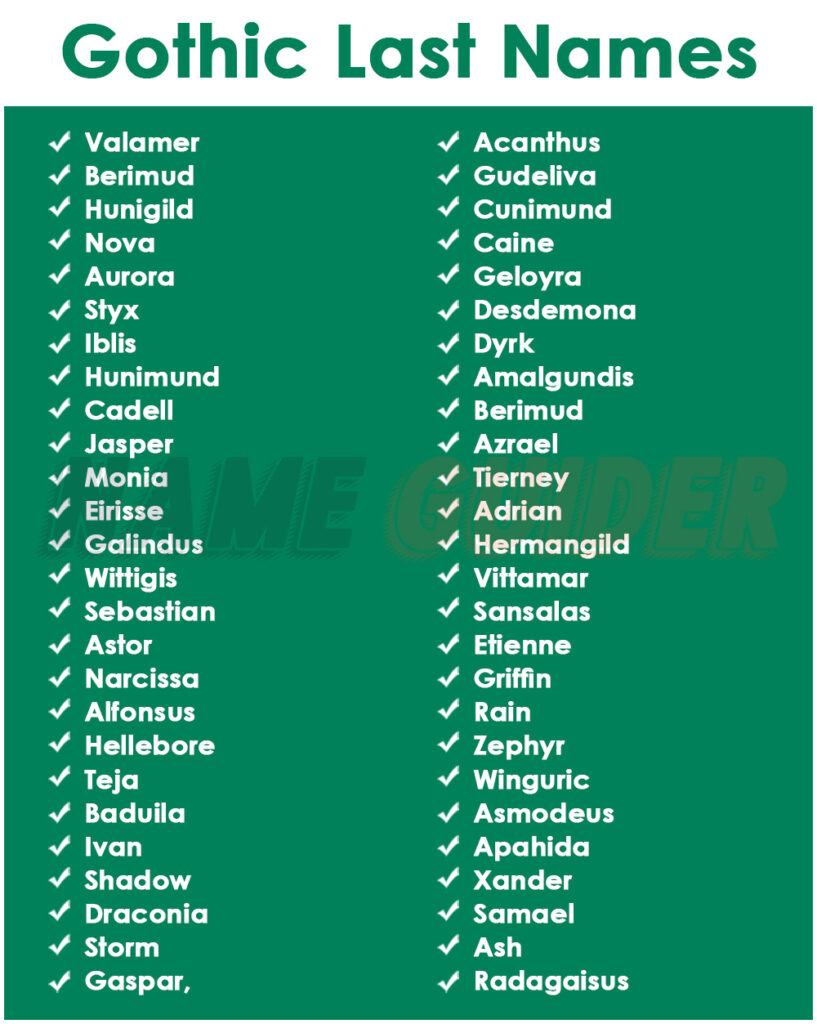Gothic last names have fascinated historians, writers, and culture enthusiasts for centuries. These names not only reflect a rich tapestry of history but also carry profound meanings that resonate with the cultural essence of the Gothic period. In this article, we will delve deep into the world of Gothic last names, exploring their origins, meanings, and how they influence identity today.
In a time when identity was closely linked to lineage, Gothic last names served as a vital link to ancestry. Understanding these names provides insight into the societal structures of the past and their evolution into the present. Join us as we uncover the mysteries behind these evocative names and their significance.
Whether you are a history buff, a writer seeking inspiration, or simply curious about the allure of Gothic culture, this exploration of Gothic last names is sure to captivate your interest. We will also provide practical tips for anyone interested in adopting a Gothic last name, ensuring a comprehensive understanding of this unique aspect of culture.
Table of Contents
- What Are Gothic Last Names?
- History of Gothic Last Names
- Popular Gothic Last Names
- Meanings of Gothic Last Names
- How to Adopt a Gothic Last Name
- Gothic Names in Modern Culture
- The Importance of Gothic Last Names
- Conclusion
What Are Gothic Last Names?
Gothic last names are surnames that have their roots in the Gothic culture, which thrived during the late antiquity and early medieval periods. These names often reflect the characteristics, professions, or locations associated with the people who bore them. They can be seen as a window into the past, providing insights into the societal norms, values, and beliefs of Gothic society.
Characteristics of Gothic Last Names
- Often derived from occupations or trades
- Can indicate geographical origins
- May reflect personal characteristics or traits
- Often have unique spellings and pronunciations
History of Gothic Last Names
The origins of Gothic last names can be traced back to the migratory tribes of the Goths, who played a significant role in the fall of the Western Roman Empire. As these tribes settled in various regions, their naming conventions evolved, giving rise to a variety of surnames that reflected their unique identities.
Influence of the Gothic Language
The Gothic language, a now-extinct East Germanic language, greatly influenced the formation of these surnames. Many Gothic last names are derived from words in this language, giving them a distinctive sound and meaning.
Popular Gothic Last Names
Some notable Gothic last names that have persisted through the ages include:
- Dracula
- Raven
- Blackwood
- Nightshade
- Grim
Each of these names carries a unique history and cultural significance, often associated with mystery and the supernatural.
Meanings of Gothic Last Names
The meanings of Gothic last names often reflect the cultural and historical context in which they were created. For example, the name "Dracula" means "son of the dragon" and is famously associated with Vlad the Impaler, a figure steeped in Gothic lore.
Examples of Meanings
- Raven: Often symbolizes knowledge and mystery.
- Blackwood: Can refer to dark woods or forests, symbolizing secrecy.
- Nightshade: A plant associated with darkness and danger.
How to Adopt a Gothic Last Name
If you're considering adopting a Gothic last name, there are several factors to consider:
- Research the name's origin and meaning.
- Consider how the name resonates with your personal identity.
- Ensure the name aligns with your cultural or artistic expressions.
Steps to Adoption
1. Identify a list of names that resonate with you.
2. Explore their historical significance.
3. Decide how you want to incorporate the name into your life.
Gothic Names in Modern Culture
Today, Gothic last names are prevalent in various forms of media, from literature to film, often embodying themes of mystery, horror, and the supernatural. Authors and creators utilize these names to evoke a certain atmosphere and to connect with audiences on a deeper emotional level.
Gothic Literature and Media
- Classic horror novels (e.g., "Dracula" by Bram Stoker)
- Modern films and series (e.g., "The Addams Family")
- Gothic music genres
The Importance of Gothic Last Names
Gothic last names serve as a vital link to our cultural heritage. They remind us of the rich history and the stories that shape our identities today. By understanding and appreciating these names, we can foster a deeper connection to our past and our own identities.
Conclusion
In conclusion, Gothic last names are more than mere labels; they are a profound reflection of history, culture, and identity. Whether you are drawn to their meanings, their unique sounds, or their cultural significance, there is much to explore and appreciate. If you found this article insightful, please leave a comment, share it with your friends, or check out our other articles for more fascinating insights into culture and history.
Thank you for joining us on this journey through the world of Gothic last names. We hope to see you again soon for more captivating content!
Article Recommendations
- Death Of Will Smith
- Skrillex Net Worth A Comprehensive Analysis Of His Wealth And Success
- Low Taper Fade


